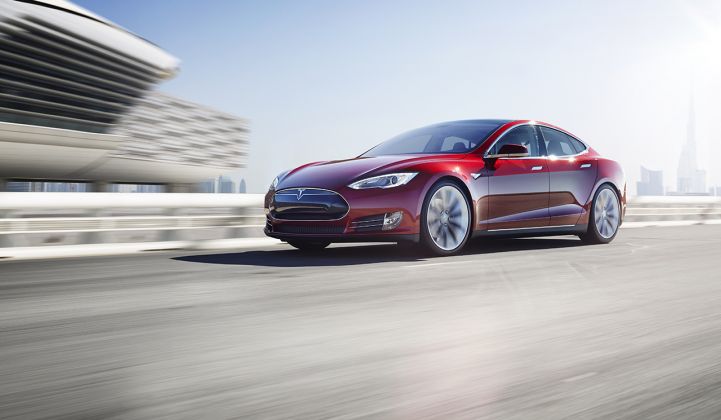Chinese electric-car maker BYD sold the most electric cars last year, beating out Silicon Valley’s Tesla, according to a new report from the analysts at Bloomberg New Energy Finance.
BYD shipped 102,500 electric vehicles (EVs) to its customers in China last year, while Tesla delivered closer to 75,000 electric cars, mostly in North America, but also in Europe and China, says the report.
However, with Tesla’s more expensive luxury EVs, the California automaker was able to generate more revenue from its electric-car sales than BYD, with its lower-cost car models.
Tesla generated revenue of $6.35 billion from electric car sales in 2016, while BYD saw sales of $3.88 billion from its electric car division. Those revenue figures are Bloomberg New Energy Finance’s estimates based on the volume of cars sold, multiplied by the company’s average retail price by region.
The world’s bestselling electric-car model was Tesla’s Model S, followed by Nissan’s Leaf and BYD’s Tang. Tesla has two models -- the S and the X -- on the top 10 bestsellers list, while BYD has three models --the Tang, the Qin PHEV and the E6 -- on the list.
Automakers delivered close to 700,000 electric cars in 2016, illustrating something of a fragmented market. BYD only held about 15 percent of the world market last year, despite selling the most cars, while Tesla held 11 percent. The top three electric car models only held 19 percent of the market in 2016, down from 29 percent in 2015, the report found.
The rankings illustrate how nascent the emerging market for electric cars still is. According to Macquarie Bank, there were 88.1 million cars and light commercial vehicles sold worldwide in 2016. That means that electric cars made up less than 1 percent of the total number of all cars sold last year.
The figures also show how different countries have vastly different markets and market leaders for electric cars. BYD dominates China, with seven models on sale there, while Tesla just started to break into China and managed to triple its car sales there in 2016 to generate $1 billion from the region.
At the same time, Tesla’s Model X and GM’s Volt were primarily sold in North America. Likewise, Mitsubishi’s Outlander and Renault’s Zoe were almost entirely sold in Europe.
The group of Renault, Nissan and Mitsubishi delivered a combined 104,460 cars globally last year. If considered as one unit, that group would take the title of having shipped the most electric cars last year. Renault and Nissan created their strategic alliance in 1999.
Because the market for electric cars is so new, expect it to change dramatically over the coming years. Tesla plans to start shipping its $35,000 Model 3 later this year, putting it into closer competition with lower-cost models from Nissan, GM, Renault and BYD.
GM started selling its all-electric low-cost car the Bolt late last year, beating Tesla’s Model 3 to market. GM’s early sales of the Bolt look promising.
Meanwhile, Nissan also plans to launch a next-generation version of its Nissan Leaf soon, which could give a boost to that model’s sales. Ford plans to launch 13 models over the next five years, while Volkswagen wants to have 30 new models by 2025.
The dominance of BYD and Tesla on the electric-car ranking list also shows how two of the world’s most celebrated business minds -- Elon Musk and Warren Buffett -- are moving into greater competition and jockeying for leads across countries. Buffett is a major investor in BYD.
It’s not the first time that Musk and Buffett have come into competition over energy markets. Buffett’s Berkshire Hathaway owns Nevada utility NV Energy, which butted heads with Musk’s solar company SolarCity. SolarCity ended up leaving Nevada after the Nevada Public Utilities Commission lowered net metering rates and upped the fees for rooftop solar customers.
Despite the still-emerging market for electric cars, you can expect the amount of electric cars on the roads to grow dramatically. Bloomberg New Energy Finance says that sales of electric cars grew by 55 percent between 2015 and 2016, and will likely grow 39 percent in 2017.
Morgan Stanley recently predicted that electric cars would make up 7 percent of the world’s car market by 2025. Exane BNP Paribas has estimated global electric car penetration could be as high as 11 percent by that time.
However, the next few years will be a time of transition for automakers. The big companies will be investing in R&D and growing the amount of electric-car models they offer. U.S. policy changes to clean-vehicle incentives may be on the way. And an upstart like Tesla, which is already investing heavily in R&D and new models, will likely eventually seek to turn an annual profit.



